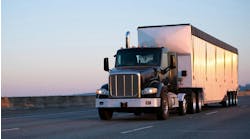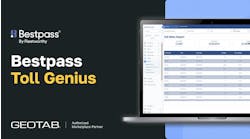Drivers and fleet managers are embracing the normality of smartphone and tablet devices, making them commonplace in their day-to-day life. Growing pains are inevitable, however, and Kevin Frey, director of warehousing and distribution at Preferred Meals, along with Aimee Schmalzle, senior director of digital and demand generation at Ryder System, Inc., joined Fleet Owner’s webinar discussion this week to share insights on the benefits of staying connected.
With the evolution of the ELD mandate, Frey said that while using a tablet, smartphone, or ruggedized handheld allows the driver to use the device for other purposes, “mobile devices are becoming the preferred delivery system of ELD information to the driver in the cab.”
The benefits of using mobile devices in trucking are described two-fold by Frey. At the same time as getting rid of manual paper trails, drivers can handle their day-to-day schedule, such as stops, provide proof of delivery, and deal with oddities in a timely manner. In addition, having driver-dispatch-customer communications can be critical.
He noted that by putting a smartphone or tablet in the hands of a driver can aid in communication and solve problems directly with the dispatcher, which in turn increases “customer satisfaction by allowing your drivers to call customers directly when there will be a delay or to follow up on deliveries.”
Because of these benefits, Frey emphasized that choosing the right mount for the device to match the cab is very important. He urges drivers and fleet managers to “do your research, test options, and choose wisely.”
Smartphone and tablet devices allow a fleet to choose the right navigation program for its drivers. Frey noted that Preferred Meals uses Omnitracs Roadnet RDC on the Roadnet Anywhere platform. With this program, “drivers can easily click assigned stops and launch turn-by-turn navigation to be guided right to the destination.”
Schmalzle of Ryder added another program to the mix – RyderGyde. With this application available for smartphones and tablets, drivers, as well as fleet managers, can schedule maintenance, call roadside assistance, compare Ryder contracted and third-party fuel prices, rent a vehicle, log fuel reports, and more.
“We want that one place, that one-stop-shop, where you can come into RyderGyde and manage a lot of aspects of your fleet in an easy and manageable way,” said Schmalzle.
As this technological era continues to evolve, Schmalzle stated that change is the new norm with customers in the driver’s seat and that delightful experiences create true adoption. By keeping drivers happy in their downtime with an unlimited data plan on their mobile devices so they can stream their favorite programs on Netflix, Hulu, or HBOGO as well as stay connected to their families and friends, as Frey suggests, true adoption can be just as inevitable as mobile communication in trucking.




